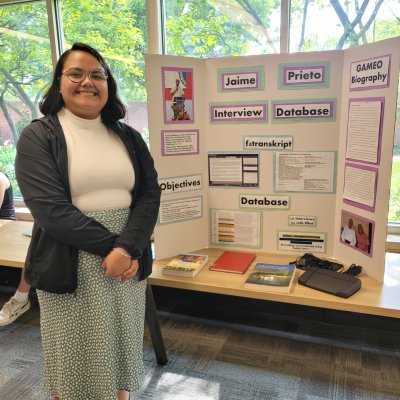Student researchers make strides with interview database

Goshen College students have been key researchers at the Institute for the Study of Global Anabaptism this year, helping to catalog and index the hundreds of oral history interviews in the Jaime Prieto Interview Collection. Recorded in the 1990s and early 2000s by Costa Rican historian Jaime Prieto, the interviews detail the memories and reflections of Anabaptists from across Latin America. History major Montce Martinez began working with the collection in the summer of 2023, as part of Goshen College’s Maple Scholars Program. Martinez’s efforts led to the creation of a basic database and initial cataloging of the digitized recordings. This database will be a crucial tool for researchers, with basic information on the interviewees; brief summaries of interview contents, subjects and themes; and the geographic scope of the interview.
Martinez’s work in the summer revealed the sheer scope of the collection. In addition to 252 interviews, the collection includes sixteen additional recordings of worship services and sermons. The interviews represent significant geographic diversity, originating from at least 15 countries and regions: Honduras, Peru, Nicaragua, Venezuela, Cuba, Colombia, Brazil, Costa Rica, Argentina, Chile, Uruguay, Paraguay, Guatemala, Puerto Rico, and Mexico. In recent months, efforts to catalog the collection have been continued by Ruam Barbosa, a senior history major from Rio de Janeiro, Brazil. As a Portuguese-language speaker, Barbosa has focused on interviews coming from Brazil, especially from the south of the country, where German-speaking Mennonites established colonies beginning in the 1930s. His work on the collection fulfills the internship requirement for the history degree at Goshen College.
Although Barbosa does not come from a Mennonite background, some of the people and events in these interviews are not so far removed from his early religious experience in Brazil. His family was Catholic on one side and Pentecostal on the other. One of the most interesting themes he has encountered is that of Mennonites engaging Pentecostal culture. “The Pentecostals that some of the interviewees talk about—their leaders are the same as the church that my mom and grandma go to. I participated in those churches from ten to fifteen years old,” said Barbosa.
Barbosa reports that working with the interviews has been a good way to learn about how a historian like Prieto, whose work Barbosa has read for various projects during his history studies, conducts oral history interviews. Barbosa has found himself particularly interested in the interaction between Mennonites and Pentecostals in the early 21st century, as Pentecostalism continued to spread. In the interviews, Barbosa encountered stories of intermarriage between Mennonites and Pentecostals and reflections from interviewees on the challenges of navigating between the two types of faith communities. He hopes to continue his studies in graduate school, with the possibility of further research on Mennonites in Brazil and continued engagement with the Brazilian interviews in the Prieto collection.

As the ISGA continues its efforts to fully catalog the Jaime Prieto Interview Collection, these recordings will be vital primary sources for researchers of Latin American Anabaptism, as well as for Goshen College students studying oral history and different forms of historical writing. New publications have already begun to emerge from use of the collection. Martinez recently published a short biography of Gildardo Cardona Tabares in the Global Anabaptist Mennonite Encyclopedia Online (GAMEO), based partially on Prieto’s 1999 interview with Cardona. Cardona was an early leader in the Mennonite Brethren Church of Colombia. The ISGA hopes that many others will make similar use of this resource as they seek to study and share stories of Anabaptist communities in Latin America.




